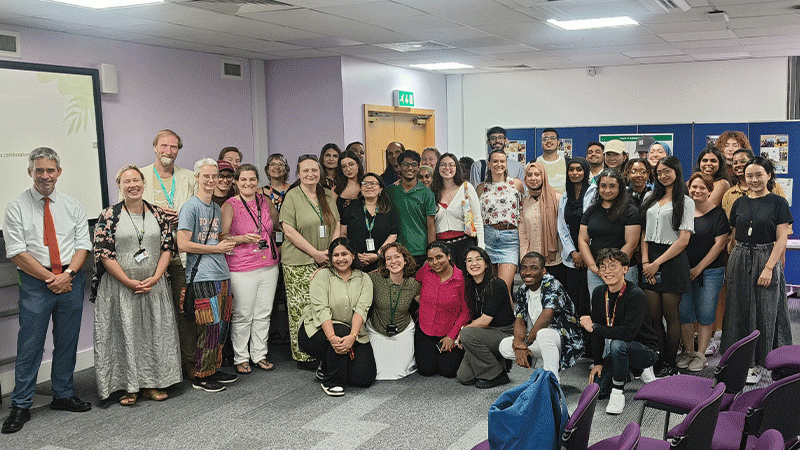The University of Westminster’s Cavendish Living Lab (CLL) showcased a range of sustainability projects developed by students and colleagues at their annual end-of-year celebration. Held on the Cavendish Campus, the event highlighted how collaborative, student-led innovation is shaping a more sustainable future.

Taking place on 18th July, Co-leads of the CLL Dr Pooja Basnett and Dr Linda Percy opened the event and introduced the agenda and background of the initiative. They described the project’s roots, from its origins as WeGrow, supported by the Centre for Education and Teaching Innovation (CETI) and the Sustainability Team, through to the current vertically integrated and multidisciplinary collaborative projects in operation today that are supported by the Quintin Hogg Trust (QHT) and Grosvenor Trust.
The student project partners then took to the stage to present the work of the students this year. Greener Future Leaders Soumya Sharma, a second-year School of Life Sciences PhD student, and Lilly Sahar, a second-year Biochemistry BSc Honours student, shared their experiences delivering workshops to schools as part of the Grosvenor Trust-funded Urban Farms for Young Minds project – a community-focused project designed to empower local communities through sustainable practices. Their workshops have reached over 200 pupils across five Westminster schools, covering topics like synthetic seeds, food miles, composting, sowing, 3D printing and hydroponics. A workshop was delivered in partnership with the Royal Society of Biology. The team shared the results of their surveys, providing valuable insights. These surveys were designed to capture their learning experiences, evaluate what they had gained from the sessions and guide the creation and delivery of future workshops.
The Food and Communities team represented by Maryam Selim, a second-year PhD student from the School of Media and Communications, and Sahara Rahman, a second-year Biological Sciences BSc Honours student, presented their work exploring how multicultural food practices can influence sustainable food systems. They premiered a trailer for a new documentary, filmed by second-year Film BA Honours student Peggy Riga, that features student interviews on food sustainability and the use of seasonal ingredients across cultures. They also showcased their new sustainable recipe cookbook, supported by the Equality, Diversity and Inclusion team, which offers creative recipes and personal stories capturing the importance of sharing meals and the power of food.
Lou-Ann Quentin, a final-year Psychology and Criminology BSc Honours student, then highlighted the Living Lab Innovators team’s mission to raise awareness of the environmental damage caused by fast fashion. The initiative featured cross-campus engagement, a sustainability message wall and a consumer habits survey. They also took part in the London Student Sustainability Conference with a recycling workshop showing how textile scraps can be turned into tote bags, reinforcing the idea that textile waste can be repurposed.
A video developed by Success Ajayi, a second-year Life Sciences PhD student, then showcased the work led by final-year Architecture and Environmental Design BSc Honours students Naqib Naser and Nour Said, in developing innovative materials - such as algae-based yarn, bioplastics, food-waste leather and bacterial cellulose - for use by Fashion Business Management with Professional Experience BA Honours students for a zero-waste exhibition at Harrow Campus.
Greener Futures Leader Julia Pinheiro Bassani, a second-year Biomedical Science BSc Honours student, then shared insights from the Pack It Green project, a collaboration between the CLL and the Fitzrovia Partnership which supports sustainability in local businesses through a survey that examined the types of materials used in their take-away and delivery packaging, as well as the challenges vendors face in adopting sustainable options. A trailer was shown on the project’s documentary, developed by Boyan Dragomirov, a final-year Film student.
The event concluded with a presentation from Sociology Lecturer Dr Emily Falconer who introduced the Westminster Interdisciplinary Food Studies Network, a new network for colleagues and graduate students with a scholarly interest in the study of food, drink, taste and consumption.
This year’s final-year CCL students were awarded with certificates by the Vice-Chancellor and President of the University Professor Peter Bonfield, who highlighted the strong commitment shown by students and colleagues in working together to make the CLL a success. The celebration’s final remarks were delivered by Deputy Vice–Chancellor of Global Engagement and Employability Professor Dibyesh Anand.
Dr Basnett said: “It was amazing to celebrate the success of the CLL with the students and colleagues who truly made it all possible. From current to past students, colleagues and collaborators, we had a wonderful time showcasing our projects, sharing memories and reflecting on how far the initiative has come. We are especially grateful to our funders – the Quintin Hogg Trust and the London Community Foundation/Grosvenor Trust for making all this possible.”
The work of the CLL directly contributes to the United Nations Sustainable Development Goals (SDGs) 12: Responsible Consumption and Production and 13: Climate Action. Since 2019, the University of Westminster has used the SDGs holistically to frame strategic decisions to help students and colleagues fulfil their potential and contribute to a more sustainable, equitable and healthier society.
Find out more about the Cavendish Living Lab at the University of Westminster.
To find out how to support the Cavendish Living Lab, please email the Development team.







